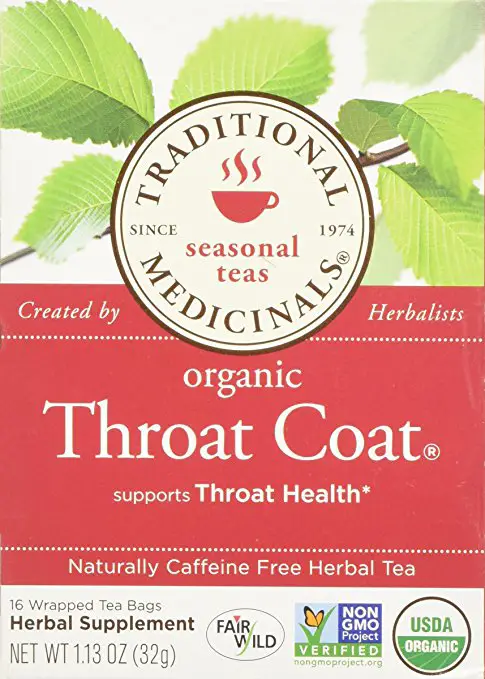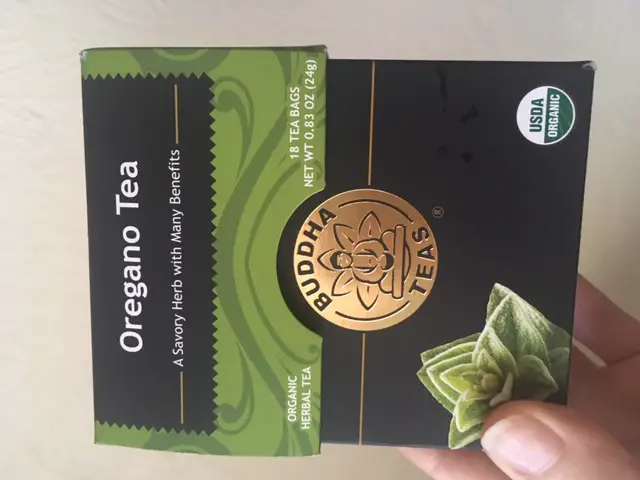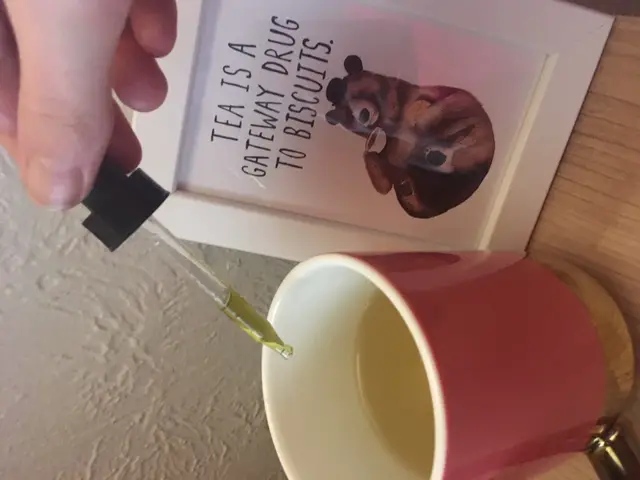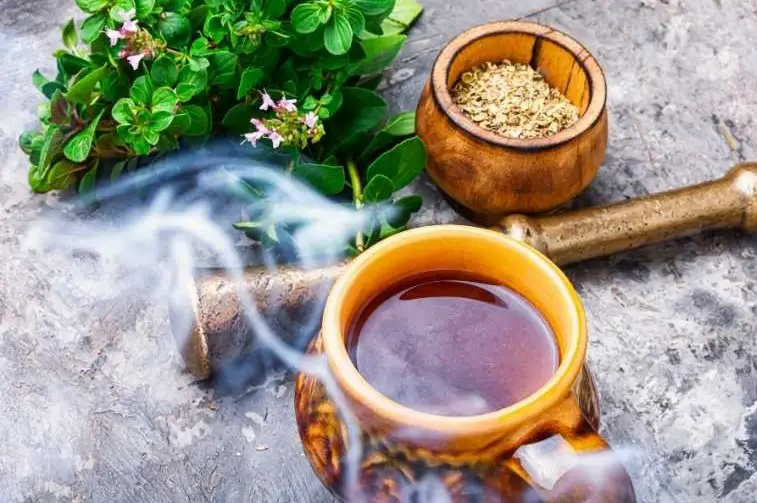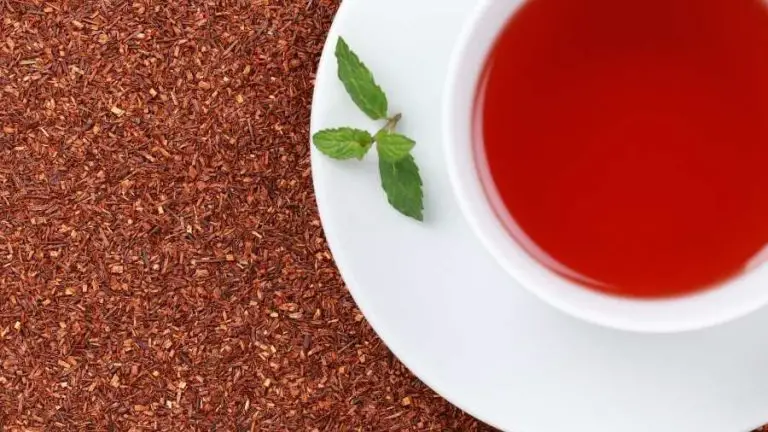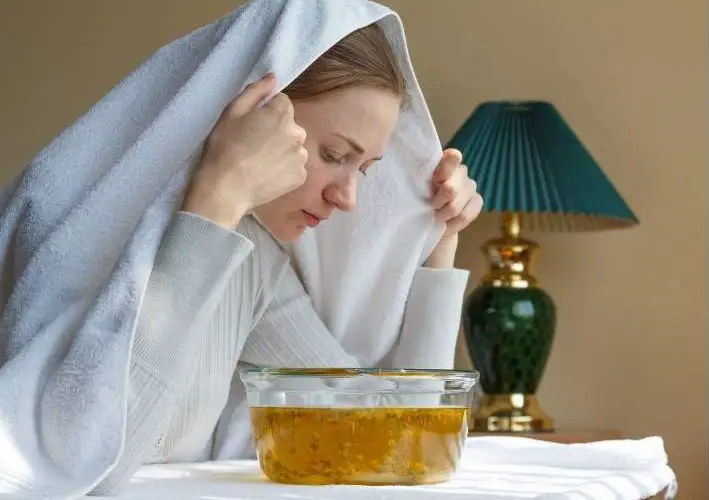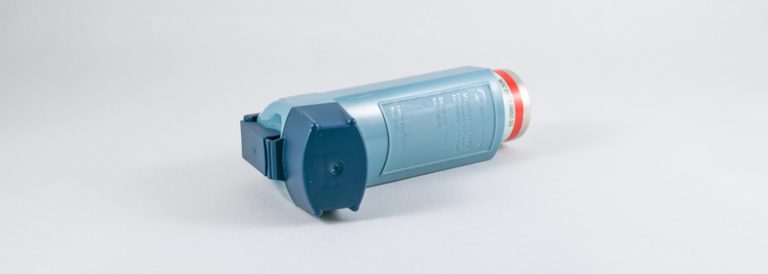Best Tea for Asthma: What I Use To Get Relief (Tasty & Affordable)
Tea is a great natural remedy for asthma. It has many proven health benefits, and certain types offer extra benefits for asthmatics. I know from experience – tea helps me treat my asthma symptoms, and I drink several cups every day.
The best teas for asthma are anti-inflammatory and anti-expectorant bronchodilators that make breathing easier. These are my favorites:
- Breathe Easy Tea (the best)
- Throat Coat Tea
- Ginger Tea
- Oregano Tea
- Turmeric Tea
These are all affordable, easy to find, help open the airways and soothe the throat. I drink them daily.
Everyone’s asthma is different, and of course we all have different tastes. I suggest you try all of the teas below and see what works best for you. I think you’ll find that tea is good for your asthma, good for your body, and good for your mental and emotional health, too.
How Does Tea Help Asthma?
My philosophy for home remedies for asthma is that they have to be healthy in their own right (no putting garlic cloves in my socks at night for me). And tea is definitely healthy. Study after study has shown that tea is really good for us.
Tea helps asthma in a number of ways. First, different nutrients in tea can have anti-inflammatory properties, can help cut phlegm, can help soothe sore throats and/or help open up the airways. Caffeine has also been shown to be a mild bronchodilator. So drinking tea helps ensure that you’re getting as many beneficial nutrients as possible.
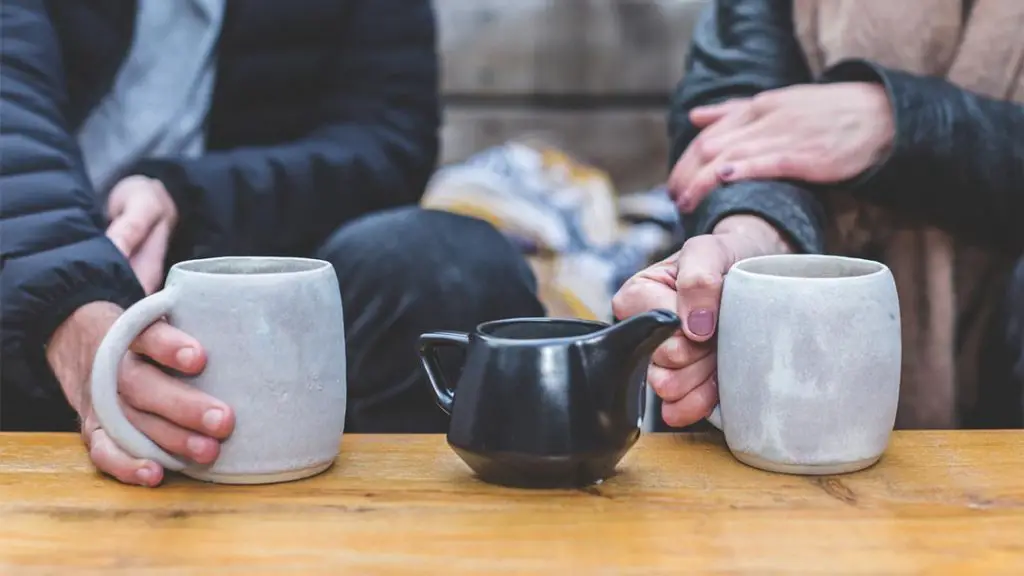
I also believe that managing stress is one of the most important things I do to keep my asthma symptoms at bay (see the science of why this is so important here). I find tea very soothing. It’s important to take time for ourselves, and sipping my cup of tea reminds me that I’m being proactive in treating my asthma.
So starting my day with a cup of hot tea, and taking tea breaks throughout the day, just feels right.
Drinking the right types of tea also keeps you hydrated, and drinking more water is one of the easiest, quickest things you can do to have an impact on your symptoms (see my tips to drink more water – and why you should – here). Pro-tip: Have a glass of water after each cup of tea, and you’ll be water logged (in a good way) before you know it. My dental hygienist also recommended that I swish my mouth with water after every few sips of tea, to keep my teeth from getting too stained!
Finally, steam can help your airways, by getting moisture into your airways to loosen up mucus or other debris (learn more here). It also lubricates the nasal passages to clear up any stuffiness that is often associated with asthma. So when my cup is first boiled, I like to (carefully) lean over and inhale the vapors slowly through my nose. Heaven. This is particularly nice to do when you’re feeling asthmatic.
A final note before we jump into the best teas for asthma. While tea can help treat asthma symptoms, it cannot cure them. These teas should be enjoyed as part of your daily regimen, but they cannot replace your medicine. And it should go without saying, but always consult your doctor before making changes in your medication.
#1 Best Tea for Asthma: Breathe Easy Tea
Breathe Easy Tea is my favorite tea for asthma because it tastes good, it’s relaxing, and it helps me if I’m feeling congested, tight chested or stuffy. It also soothes my throat.
Most of the teas on my list are generic, but this specific tea is worth trying if you have asthma. I stumbled across it one day in my local grocery store, and now I see it everywhere (find it on Amazon here). And I’m glad I did. It was one of the first ‘holistic remedies’ for asthma that I ever tried, and I found it so helpful that it made me want to keep finding new ways to manage my symptoms.
Breathe Easy Tea is a combination of traditional Chinese medicine, including licorice root, peppermint and eucalyptus, meant to promote respiratory health. They say that “Our unique formula taps into both Western herbalism—with traditional herbs like fennel, licorice and eucalyptus—and Traditional Chinese Medicine, with Bi Yan Pian, a beloved blend of eleven Chinese herbs. Engage your senses with the herbal remedy that has supported lungs for over four decades.”
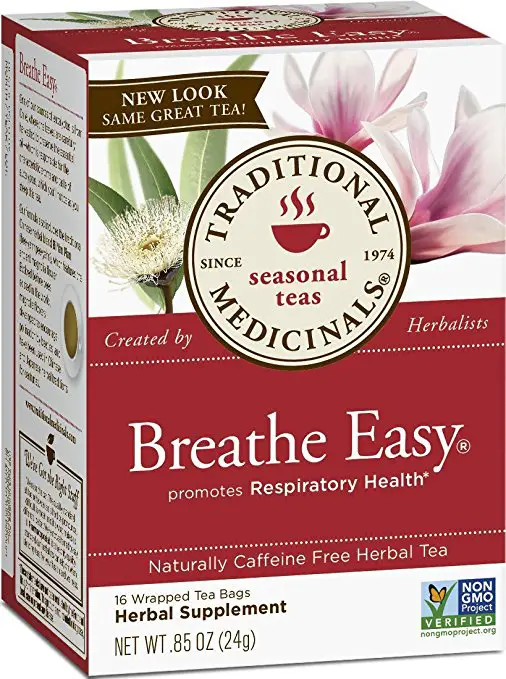
Here is a breakdown of how the main ingredients in Breathe Easy Tea can help asthmatics:
- Organic fennel fruit: used to reduce stress and clear mucus from the airways (source)
- Organic licorice root: used to reduce inflammation, soothe sore throats and treat upper respiratory problems (source)
- Organic eucalyptus leaf: used to reduce inflammation, relieve nasal congestion, and reduce stress (source).
- Bi Yan Pian: a Chinese herb used for nasal congestion and allergies (source)
- Organic peppermint leaf: used to open up the airways (source)
- Organic ginger rhizome: used to reduce inflammation and soothe airway muscles (source)
I find a cup of Breathe Easy Tea in the morning, especially if I take a few minutes to breathe in the steam, is the perfect way to start my day. And I know I’m not alone – the reviews from fellow asthmatics could not be more glowing.
#2: Organic Throat Coat Tea
Throat Coat Tea is another tea that is affordable and easy to find (here it is on Amazon). In fact, I usually see this in my grocery store more often than Breath Easy. It’s made by the same company , ‘Traditional Medicinals,’ and I really like their focus on sustainability and sourcing organic ingredients.
Organic Throat Coat Tea is made with marshmallow root, and ‘marshmallow’ is way less fun when it’s not mixed with lots of sugar and coated with chocolate. I’m not going to lie: this tea is an acquired taste. I usually add a little honey (more on that below).
But if you have asthma, you know that sore throats go hand-in-hand with the condition, and that coughing and feeling uncomfortable make your symptoms worse. And this tea really works to soothe your throat, in a way that’s hard to describe. Just like the name suggests, it actually does coat your throat, in a calming way that lasts well after the tea is gone.
Here’s a breakdown of the main ingredients in Throat Coat Tea that can help asthmatics:
- Slippery elm: a North American tree whose bark contains mucilage, a sticky mixture that coats the throat (source). Popular with singers and public speakers!
- Marshmallow root: used to build a protective coat in the throat and mouth, this plant may help with respiratory issues (source)
- Licorice root: used to treat coughs, sore throats and asthma (source)
As you can see, this tea is chock-full of ingredients to help sooth the throat and therefore – hopefully – help your throat feel better.
#3: Ginger Tea
Ginger tea is a healthy tea that anyone can make at home, making it a great option for people with asthma. Ginger tea is warming and delicious, and there is plenty of research to suggest it can help relieve asthma symptoms.
Ginger has many well studied positive health benefits. It can help your body ward off germs (both some viruses and some bacteria), it can help fight the oral bacteria that leads to gum infection, it can calm nausea and indigestion (I personally like to have ginger tea before meals), and it can soothe sore muscles. Ginger is anti-inflammatory, making it great for arthritis, and studies show it might help ease menstrual cramps. More research needs to be done, but there are some studies suggesting it can even lower cholesterol, lower blood sugar, and slow down some cancers (source).
Clearly, ginger root has many benefits, but is there any special reason people with asthma should consume it? Yes! That’s because new studies have shown that ginger can also help benefit the respiratory system.
This study from 2019 confirmed that not only can ginger soothe sore throats and ease congestion (which we asthmatics would be happy to treat!), it is also effective at preventing inflammation in the respiratory system. Specifically, modern research has confirmed that ginger is effective at preventing colds, sore throat, laryngitis, congestion and inflammation of the mucosal layer. It has been confirmed to help prevent respiratory disease and (wait for it!) decrease asthma symptoms.
To sum up, ginger tea is a de-congesting, anti-inflammatory antioxidant, it tastes great, it can help with asthma symptoms, and it is generally safe … so what are you waiting for? Many people like to grate fresh ginger into hot water to create super fresh ginger tea, but dried ginger works, too. I tend to drink dried ginger tea more often, just because it’s easier to buy a box of already-made tea bags. I really like green ginger tea, like this one that is available on Amazon here.
#4: Turmeric Tea
Turmeric is another tea that is jam-packed with health benefits, that may also be good for people suffering from asthma. I try to have a cup at least once a day.
Specifically, turmeric is another strong anti-inflammatory, which has been shown to reduce pain and swelling of arthritis, boost the immune system, lower cholesterol and maybe even help prevent Alzheimer’s and cancer (source). These reasons alone were enough for me to want to try it out.
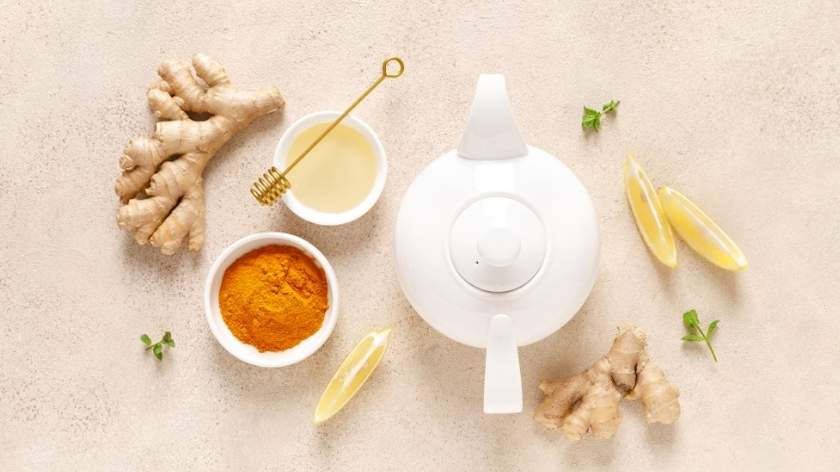
There are also studies that suggest that turmeric may have properties of special interest to asthma patients. For example, this study found that curcumin (the active component in turmeric) helped improved airway instruction, and concluded that it is “effective and safe as an add-on therapy for the treatment of bronchial asthma.”
There are many ways to get turmeric into your diet. You can use it to flavor many dishes (it is especially popular in Indian cooking), you can make golden milk, you can take it in capsule form, or you can drink turmeric tea like I do. To enjoy turmeric tea, you can either make it yourself, using ground turmeric or grating turmeric root (you should be able to find turmeric in your grocery store, usually next to the ginger root).
Or, you can take the easy road and buy turmeric tea like I do. Traditional Medicinals offer one on Amazon (find it here) that is flavored with ginger, amping up the asthma-fighting power!
And a note on the flavor. Turmeric is bitter and a bit spicy. I enjoy it, but it is strong and may be an acquired tasted. That’s why you may want to try a variety of turmeric tea that is blended with other ingredients (like the ginger turmeric tea I linked above), or add a little honey.
#5: Oregano Tea
You’ve heard about oregano on pizza … but what about oregano in your tea pot? Turns out, this is another herb that has great potential health benefits for people with asthma. Like many of the other teas in this article, it is anti-inflammatory and anti-bacterial, and full of antioxidants and vitamins, including Vitamins A, C, E and K (source).
According to WebMD, oregano contains chemicals that “might help reduce cough and spasms.” And while we need more studies on its direct impact on asthma, the fact that it oregano oil is a known anti-inflammatory was enough for me to give it a try (asthma is caused by inflammation of the airways, after all).
You can take oregano as a supplement, and oregano oil is very popular among natural health enthusiasts (learn more about how to use oregano oil for asthma here). Or, you can do what I do – use it liberally while cooking, and drink oregano tea. I can’t lie – I was apprehensive about trying oregano tea, because it just sounded weird. But it turns out, I love the flavor, and so I enjoy this tea regularly. Learn more about the benefits of oregano tea on lung health here.
You can make oregano tea from the herbs in your pantry, but again, I like to buy tea bags so I don’t have to mess around. I went with this Oregano Tea from Buddha blends and was very happy with it (I particularly like that they use unbleached tea bags). Find it on Amazon here.
#6: White, Green and Black Tea – with a Caution
A recent study found that caffeine can “improve airways function modestly, for up to four hours, in people with asthma.” The health benefits of regular tea are now well known, and of course tea is popular for a reason – it’s pleasant to sit back with a cup. For all these reasons, feel free to drink white, green and black tea if you have asthma. But there is a caveat.
Too much caffeine is not good for anyone, especially those with asthma. It can make you jittery and sweaty, and maybe even think you’re having an asthma attack. So don’t over do it, especially if you find caffeine is one of your triggers.
And it takes caffeine up to 9 hours to leave your body, and if you have caffeine in your system, it will affect your sleep. I believe that improving your sleep is one of the most important things you can do for your health and your asthma (if your asthma is worst at night and keeps you up, read this for a simple fix). So I try to limit my caffeinated tea intake to one cup a day, first thing in the morning.
And this should go without saying, but caffeine alone will not stop an asthma attack. Never use any of these teas (or any natural treatments, for that matter), in place of your medicine.
The great thing about green and black tea is that you can get it cheaply in just about any store. If you can, opt for organic varieties. If you’d like to get fancy, then I highly suggest exploring Buddha Teas, which offers organic and wildcrafted teas made from fresh herbs and tea leaves, packaged in bleach-free bags. They have an incredible variety and they’re all reasonably priced – see the Buddha Tea shop here.
#7: CBD Tea
CBD is one of my favorite treatments for asthma. Studies on the effect of CBD on asthma have been overwhelmingly positive, and no study that I can find (at the time of writing this article) has found it to have negative side effects for asthmatics. It is a powerful anti-inflammatory that can help lessen asthma symptoms. Learn more about the latest research on how CBD can directly benefit asthma patients here.
When I started researching CBD, I decided it was worth a try (it is legal where I live), and I was pleasantly surprised by how quickly I saw results. I’d already done a lot of work to reduce how frequently I used my puffer, but CBD helped me get to a place where I feel like I almost never need it at all (although I still always carry it with me). Learn more about my journey with CBD and asthma here.
There are many ways to take CBD, and I usually take it as an oil in capsule form (see more about how to use CBD oil here). But, you can also add CBD to any of the teas above, to make your own turbo-charged tea for asthma.
The most affordable way to make CBD tea for asthma is to add either a CBD oil or an tasteless isolate powder to your tea. I like these ones available from PureSpectrum, and if you use the promo code ‘treatasthma’ (or just click this link), you’ll get 15% off your order. Be sure to let your tea cool a little before adding your CBD, so that you don’t degrade the quality.
Ordering from a company like Pure Spectrum is great, because it’s convenient and affordable. It’s not always easy to find dispensaries that sell CBD, but if you do, you may want to check them out to see if they sell already-made CBD tea bags. They’ll likely be more expensive than making it yourself, but you may want to try that option.
Either way, making CBD tea is a great way to get all the benefits of tea, plus all the benefits of CBD, too.
Tea for Asthma Pro-Tip: Add Honey
A final tip for anyone new to the tea game. Not only does honey make tea taste better, but it is also great for asthma! In fact, this study from 2017 says that honey has been shown to reduce asthma-related symptoms and act as a preventative agent. And this study found that combining ginger with honey actually increases ginger’s effectiveness against microorganisms.
I personally love the taste of tea, but if you’re new to tea, you might find it a bit bitter. Adding honey will make it taste better, while also making it healthier (just don’t over do it).
Honey is also just nice for soothing the throat, too.
So if you want to make your tea a little sweeter, don’t be afraid to add honey! Local and organic is always best, but if you’d like a cheaper alternative, this honey on Amazon is reasonably priced, raw, unfiltered and very well reviewed.
Final Thoughts: How To Use Tea To Manage Asthma
Drinking a cup of tea isn’t going to cure your asthma. Drinking multiple cups of tea every day also isn’t going to cure your asthma either. But it’s a healthy step in the right direction, that will also make you feel better and add some relaxing, meditative moments to your day.
If you’re trying to use your puffer less, then see if you can pause and make a cup of tea the next time you want to take a puff. Don’t overdo it – if you need your puffer, take it. But wanting to take your puffer is different from needing to take your puffer. See if soothing yourself with a cup of tea might do the trick.
If you’d like to explore even more tea, don’t miss my list of 21 great teas for asthma here.
And overall, drink as much tea as you can throughout the day (keeping caffeinated tea to the morning) and see how it makes you feel. You’ll start to develop some favorites, that I bet you’re really look forward to. Happy breathing and happy sipping!


